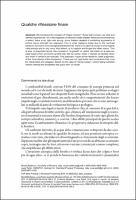Chapter Qualche riflessione finale
| dc.contributor.author | Bellanca, Nicolò | |
| dc.contributor.author | Pardi, Luca | |
| dc.date.accessioned | 2022-06-01T12:16:54Z | |
| dc.date.available | 2022-06-01T12:16:54Z | |
| dc.date.issued | 2020 | |
| dc.identifier | ONIX_20220601_9788855181952_411 | |
| dc.identifier.issn | 2704-5919 | |
| dc.identifier.uri | https://library.oapen.org/handle/20.500.12657/56228 | |
| dc.description.abstract | We introduce the concept of "tragic choices": those that concern our vital and identity experiences. As in the tragedies of classical Greek theater, there are circumstances in which there is no right and wrong, since theses capable of exhibiting arguments of almost equal strength are opposed. This is what happens today due to the contrast between economic and ecological predicaments: there is no optimal choice in this regard, valid always and in any case, that allows us to neglect and forget the other option. This is why, in pragmatic terms, the concept of “a-growth” is useful: we check on a case-by-case basis when economic growth can still be useful, when it should be slowed down and when it needs to be reduced. This approach is part of the research, itself pragmatic, of the "boundaries of the biosphere". These are not rigid limits, but constraints that must be interpreted and adapted, based on the idea of "being happy", where being satisfied means making the biosphere feel good with us inside. | |
| dc.language | Italian | |
| dc.relation.ispartofseries | Studi e saggi | |
| dc.subject.other | Tragic choices | |
| dc.subject.other | a-growth | |
| dc.subject.other | biosphere | |
| dc.subject.other | trade-offs | |
| dc.subject.other | be satisfied | |
| dc.subject.other | pandemic | |
| dc.title | Chapter Qualche riflessione finale | |
| dc.type | chapter | |
| oapen.identifier.doi | 10.36253/978-88-5518-195-2.17 | |
| oapen.relation.isPublishedBy | bf65d21a-78e5-4ba2-983a-dbfa90962870 | |
| oapen.relation.isbn | 9788855181952 | |
| oapen.series.number | 215 | |
| oapen.pages | 4 | |
| oapen.place.publication | Florence |

